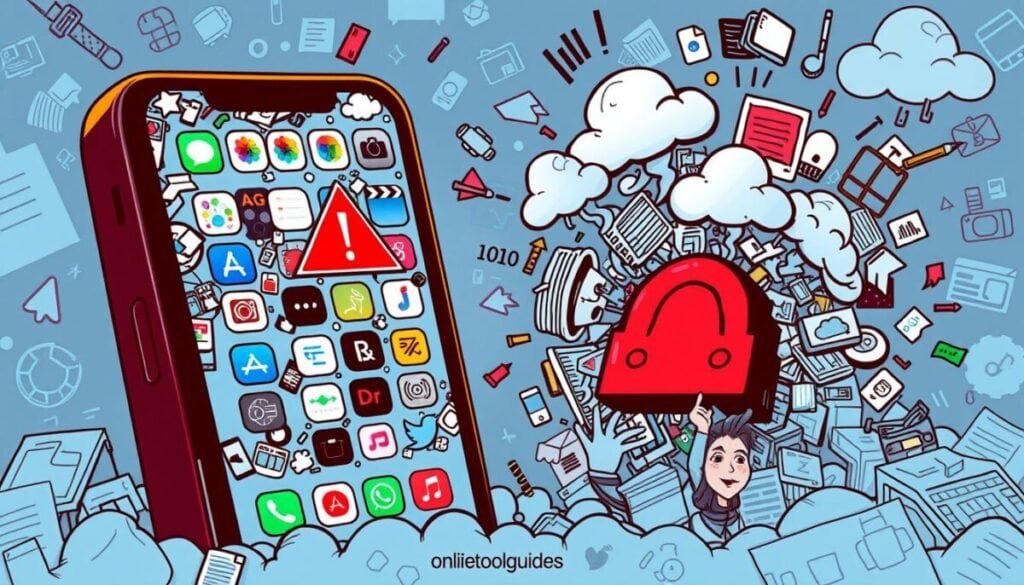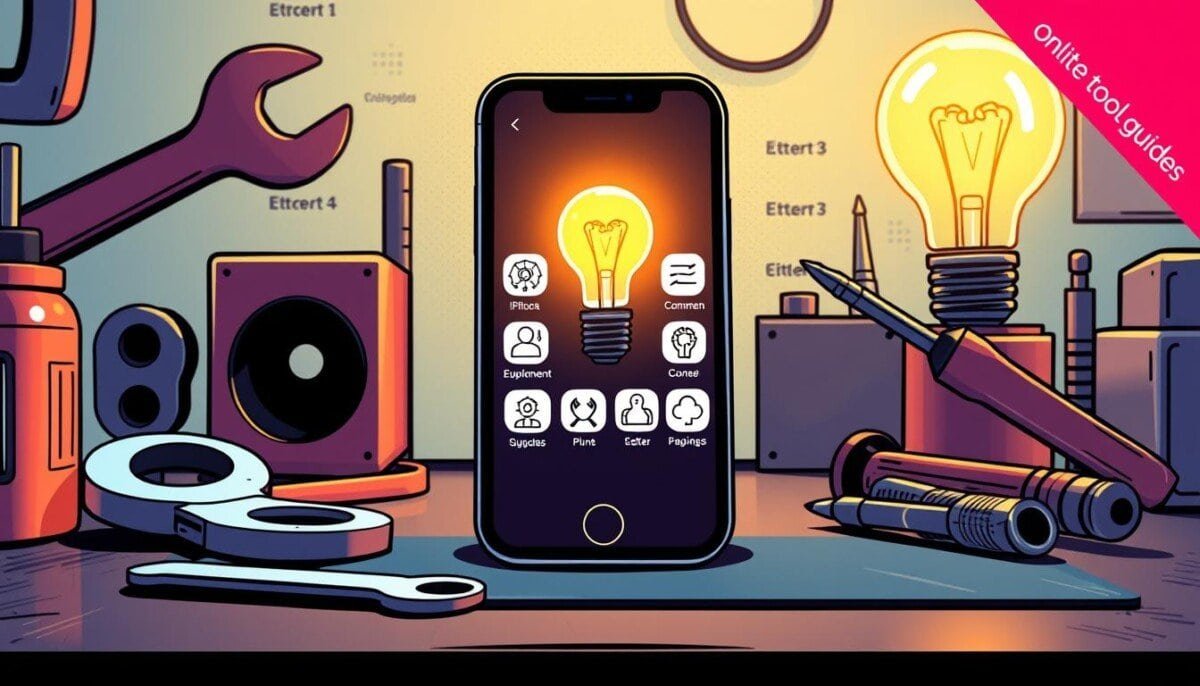Did you know over 80% of iPhone users face battery health issues when their battery drops below a certain level? This shows how crucial it is to fix common iOS problems. Whether it’s iPhone or iPad, knowing how to solve issues can make a big difference. This guide will show you how to tackle various iOS problems, helping you fix them fast.
Key Takeaways
- Battery health below 80% may require a replacement.
- iOS devices often face software glitches that can be fixed with updates.
- Connection problems like Wi-Fi and Bluetooth can often be resolved quickly.
- Recognizing symptoms of issues helps in swift troubleshooting.
- Proper maintenance can extend the life and efficiency of your iOS devices.
Understanding Common iOS Issues
Using iOS can lead to many problems. These issues can make using your device frustrating. Knowing the signs of these problems is key to fixing them.
Users often see their devices freeze, batteries drain fast, or apps crash. Spotting these signs helps find the root cause. This could be due to software, hardware, or compatibility issues.
Identifying Symptoms
Signs of iOS problems vary. They depend on the device and the issue. Here are some common ones:
- Battery drains quickly: You might need to charge it often during the day.
- Device freezes: The screen might freeze, needing a hard reset.
- Apps crashing: Apps might crash often while you’re using them.
- Connectivity issues: Wi-Fi or cellular network problems can block online access.
Causes of Problems
Knowing why these symptoms happen helps fix them faster. Common reasons include:
- Software updates: New updates can cause compatibility issues.
- Corruption during data transfer: Bad data transfers can lead to software glitches.
- Hardware failures: Old devices may face hardware problems.
Common Scenarios
Knowing when problems happen helps solve them. Here are some common situations:
- Device behavior after an upgrade: New updates can mess with how things work.
- Issues following jailbreaking: Unauthorized changes can harm quality and performance.
- Problems from unauthorized app installations: Bad apps can make your device unstable.
Understanding iOS issues is key to better use. Fixing software, hardware, and compatibility problems can make your device work better.
Resolving Connectivity Problems
Connectivity issues can really mess up your iPhone. It’s key to fix Wi-Fi, Bluetooth, and cellular network problems. By using iOS updates troubleshooting and iOS settings troubleshooting, you can solve these issues. Here are some common ways to fix connectivity problems.
Wi-Fi Issues
Network settings errors often cause internet loss. These problems can come from iOS bugs or system issues. Here are some fixes:
- Restart both your iPhone and Wi-Fi router.
- Reset network settings to their factory settings.
- Make sure your iOS is up to date to fix connectivity bugs.
- Turn off any active VPNs for now.
- Forget and reconnect to your Wi-Fi network.
Bluetooth Troubles
Bluetooth might not work because of compatibility or settings. Resetting connections usually fixes these issues:
- Forget devices that won’t connect, then pair them again.
- Update iOS to fix Bluetooth bugs.
- Restart Bluetooth in your iOS settings.
Cellular Network Fixes
Cellular network issues can come from SIM card problems, carrier issues, or device damage. Here’s how to troubleshoot:
- Restart your device and check the network.
- Make sure network settings are correct.
- Call your internet service provider for help.
- Check for carrier outages or account restrictions.
- Reset the SIM card or test with another device if problems continue.
Fixing connectivity issues can greatly improve your iPhone use. By following steps for Wi-Fi, Bluetooth, and cellular network problems, you can make your device more reliable.
Addressing Battery Performance Concerns
It’s key to spot iOS battery performance issues to keep your device running well. Knowing why your battery drains fast is important. It could be because you use apps too much, or because of background tasks or software updates.
Battery Drain Causes
Many things can make your battery drain. Here are some common ones:
- Background app refresh using power all the time
- Active location services tracking you often
- Screen brightness being too high
- Old apps not working well with new iOS
- Features like Bluetooth or Wi-Fi on when not needed
Tips for Battery Preservation
There are simple ways to make your battery last longer. Here are some tips:
- Lower your screen brightness or use auto-brightness.
- Turn off background app refresh to save power.
- Stop location services for apps that don’t need them.
- Close apps you’re not using.
- Make sure your iOS is up to date for better performance.
When to Replace the Battery
Knowing when to replace your battery is important. Look out for these signs:
- Battery draining fast even when you’re not using it much
- Phone shutting down unexpectedly
- Battery looks swollen or deformed
- Phone not working well even after trying iPhone troubleshooting tips
Getting a new battery can make your phone work better again. Keeping an eye on your battery health helps your iPhone last longer. This way, you can enjoy your phone without any problems.
Fixing Software Glitches and Crashes
Fixing iOS software glitches needs a clear plan. Follow these steps to solve problems and make your device work better.
Restarting the Device
One easy fix is to restart your device. It clears out temporary files and refreshes your system. This often solves small crashes. For bigger problems, try a force restart:
- Press and quickly release the Volume Up button.
- Press and quickly release the Volume Down button.
- Press and hold the Side button until the Apple logo appears.
Updating iOS
It’s key to keep your iOS up to date. Apple fixes bugs and glitches in new updates. To check for updates, go to Settings > General > Software Update. If updates are there, installing them can fix many issues like:
- New error codes during upgrades.
- App Store loading problems.
- Bluetooth and Wi-Fi connectivity issues.
Factory Reset Considerations
If problems keep coming back, think about a factory reset. Do this only after backing up your important stuff. It resets your device to its original state. Here are some things to remember:
- A factory reset can fix serious software glitches.
- Be aware that you might lose some data.
- Restoring from a backup can help keep your important stuff safe after a reset.
Staying current with updates and managing apps wisely can prevent iOS software glitches. Spotting and fixing problems early makes for a better user experience.
Managing App-related Issues
App problems can really mess up your iOS device. Crashes and freezes can stop things from working right. Keeping apps updated and setting the right permissions helps a lot. These steps make fixing iOS app issues easier.
App Crashes and Freezes
App crashes and freezes are really annoying. There are simple steps to fix them. First, make sure your device meets the app’s needs. Always check for updates to avoid bugs. You can also try clearing the app’s cache or storage to resolve common issues. Restarting your device is another effective way to fix glitches and improve performance. If the problem persists, search online for specific Android app crashing solutions, as they often include detailed troubleshooting steps tailored to your app.
If an app won’t work, try restarting your device or reinstalling the app. This often fixes the problem.
Updating and Reinstalling Apps
Keeping apps updated is key to their smooth running. Using the latest version stops many problems. If an app doesn’t work, try uninstalling and reinstalling it.
Many users find this helps a lot. In fact, 43% of users try reinstalling apps to fix issues.
Permissions and Privacy Settings
Apps need the right permissions to work well. It’s important to check your privacy settings. Look for any denied permissions that might cause problems.
Going through your permissions carefully is a big part of fixing iOS app issues.
| Issue Type | Common Solution | Statistics |
|---|---|---|
| App Crashes | Force Restart Device | 14% of users attempted |
| App Freezes | Reinstall App | 43% of users attempted |
| Features Not Available | Check Internet Connectivity | 71% for social apps |
| Login Issues | Verify Account Preferences | 29% for Apple native apps |
Dealing with Storage Space Problems
Storage space issues can slow down any iPhone. It’s important to know what’s taking up space. Apps, videos, and cache files can fill up your phone quickly.
Users might see messages saying they don’t have enough space. This can happen even when there’s room on the phone.
Identifying Storage Hogs
Big apps and games use a lot of space. So do cached data and photos and videos. System junk and logs also take up room.
Optimizing Storage Usage
There are ways to make your iPhone use less space:
- Turn on Offload Unused Apps to save data but keep the icon.
- Get rid of old photos, videos, and apps you don’t need.
- Clear Safari’s cache to free up space.
- Delete old messages to save room.
- Stop apps from downloading music automatically.
- Use Optimize iPhone Storage for photos to manage space better.
iCloud Storage Solutions
iCloud can help with storage problems. It offers up to 2TB of space. But, a full iCloud can still cause warnings.
If you see warnings about iCloud storage, check your usage. Managing your iCloud data is key.

For more space, consider a bigger iPhone. Knowing how to manage storage helps your device run smoothly.
| Storage Management Strategy | Description |
|---|---|
| Offload Unused Apps | Removes app data while retaining the icon, freeing crucial space. |
| Clean Up Files | Involves deleting old photos, videos, and unused apps for optimization. |
| Clear Cache | Transformative reduction of space used by apps, particularly Safari. |
| Delete Messages | Reclaim valuable storage by removing old SMS and iMessages. |
| Toggle Automatic Downloads | Disables unwanted music downloads, conserving storage. |
| Optimize iPhone Storage | Automatically adjusts photo storage, enhancing space management. |
Seeking Additional Help and Resources
When you can’t fix common iOS problems, getting more help is key. Official Apple Support has lots of guides and help for many issues. They can help with enrollment errors, software bugs, or hardware problems.
Official Apple Support
Apple’s support team is great at fixing tough problems. They help with things like battery drain or app issues. Using Apple’s support can fix your problems faster and make your device work better.
Online Communities and Forums
Joining online groups and forums is helpful. Users share tips and fixes for tech problems. Sites like Reddit or Apple’s forums have real solutions from others who’ve solved the same issues.
Local Repair Services
For big problems, try local repair services. They can fix hardware and do advanced software repairs. Make sure the service is certified and knows iOS devices well. This way, you can enjoy your device again without stress.



